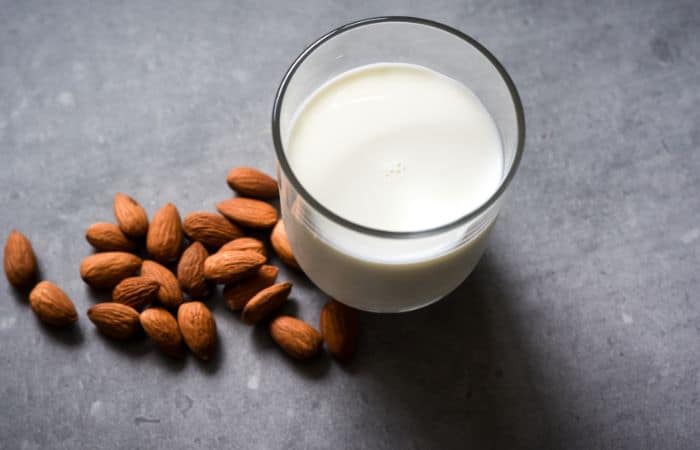Gastritis, a condition characterized by inflammation of the stomach lining, can cause discomfort and pain in the upper abdomen. While medical treatment is crucial in managing gastritis, dietary choices also play a significant role. Many people with gastritis seek alternatives to dairy milk due to lactose intolerance or dietary preferences, and almond milk has gained popularity as a plant-based milk option. But is almond milk good for gastritis?

Almond Milk and Gastritis
Gastritis patients often wonder if almond milk is a suitable option for their dietary needs. Almond milk is a popular plant-based milk alternative made from ground almonds and water. It is often chosen by those who are lactose intolerant or following a plant-based diet, and it is known for its mild and slightly sweet taste. But how does almond milk potentially impact gastritis?
Nutritional Content of Almond Milk
Almond milk is a good source of essential nutrients. It is naturally low in fat and cholesterol, and it contains important vitamins and minerals such as vitamin E, calcium, and vitamin D (if fortified). Additionally, almond milk is often fortified with other nutrients like protein, which can be beneficial for those with gastritis as they may require additional protein for healing and repair of the stomach lining.
Low Acidity
One potential benefit of almond milk for gastritis patients is its relatively low acidity compared to cow’s milk. Gastritis is often aggravated by acidic foods and beverages, which can irritate the stomach lining. Almond milk, with its lower acidity, may be a gentler option for those with sensitive stomachs, potentially causing less irritation and discomfort.
Anti-Inflammatory Properties
Almonds are known for their anti-inflammatory properties, and almond milk may inherit some of these benefits. Chronic inflammation is believed to play a role in the development of gastritis, and consuming anti-inflammatory foods may help reduce inflammation in the stomach lining. Almond milk, with its potential anti-inflammatory properties, may be a beneficial addition to a gastritis-friendly diet.
Potential Concerns
While almond milk can be a suitable option for some gastritis patients, it may not be suitable for everyone. Some individuals may have allergies or sensitivities to almonds, which could trigger adverse reactions. Additionally, store-bought almond milk may contain added ingredients such as sweeteners, thickeners, or preservatives, which may not be well-tolerated by all gastritis patients. It’s essential to read labels and choose almond milk with minimal additives and consider individual tolerance levels.
Personalization is Key
As with any dietary choice, it’s crucial to consider the individual needs and preferences of each gastritis patient. While almond milk may be a suitable option for some, it may not be ideal for others. Some individuals with gastritis may find that they tolerate almond milk well, while others may not. It’s important to listen to your body, monitor your symptoms, and work with a healthcare provider or registered dietitian to determine if almond milk is a good fit for your individual needs.

How to Incorporating Almond Milk Into a Gastritis Diet
If you’re considering incorporating almond milk into your diet as part of managing your gastritis, it’s important to do so carefully and with consideration for your individual needs. Here are some tips on how to safely incorporate almond milk into a gastritis-friendly diet:
Choose Unsweetened and Unflavored Options
When selecting almond milk, opt for unsweetened and unflavored varieties. Sweeteners and flavorings, even natural ones, may trigger symptoms in some gastritis patients. Read labels carefully and choose almond milk with minimal added ingredients to avoid potential irritants.
Consider Fortified Options
Almond milk is often fortified with vitamins and minerals, which can be beneficial for individuals with gastritis. Look for almond milk that is fortified with essential nutrients such as calcium, vitamin D, and protein to ensure you’re getting adequate nutrition.
Listen to Your Body
Every individual is unique, and what works for one person may not work for another. Pay attention to how your body responds to almond milk. If you notice any discomfort, bloating, or other symptoms, it’s important to discontinue use and consult with your healthcare provider or registered dietitian.
Balance Your Diet
Almond milk should be considered as part of a well-balanced diet for gastritis patients. It’s important to focus on a variety of foods that are gentle on the stomach, such as lean proteins, whole grains, fruits, vegetables, and healthy fats. Avoiding trigger foods and maintaining a balanced diet overall can help manage gastritis symptoms.
Consider Alternatives
While almond milk is a popular plant-based milk option, it may not be the best fit for everyone with gastritis. Some individuals may find that other plant-based milk alternatives, such as rice milk or oat milk, work better for their specific needs. Experimenting with different options and finding what works best for your body is key.
Nutritional Benefits of Almond Milk for Individuals with Gastritis
Almond milk, a plant-based milk alternative made from almonds, can provide several nutritional benefits for individuals with gastritis, which is inflammation of the stomach lining. Here are some potential nutritional benefits of almond milk for individuals with gastritis:
Low Acidity
Gastritis is often aggravated by consuming acidic foods and beverages. Almond milk has a slightly alkaline pH, which means it is less acidic compared to dairy milk and some other milk alternatives. This may help reduce the risk of further irritating the inflamed stomach lining in individuals with gastritis.
Low Fat Content
Almond milk is generally lower in fat compared to cow’s milk. For individuals with gastritis, a low-fat diet may be recommended to reduce irritation to the stomach lining. Almond milk can be a good option as it typically contains less saturated fat compared to cow’s milk, which may be more easily tolerated by individuals with gastritis.
Nutrient-Rich
Almond milk can be a good source of essential nutrients, including vitamin E, calcium, and vitamin D, when fortified. Vitamin E is an antioxidant that may help reduce inflammation in the stomach lining, while calcium and vitamin D are important for maintaining strong bones and teeth, which may be especially beneficial for individuals with gastritis who may have difficulty absorbing nutrients from food due to inflammation.
Lactose-Free
Almond milk is naturally lactose-free, which can be beneficial for individuals with gastritis who may have lactose intolerance or sensitivity. Lactose intolerance is a condition where the body has difficulty digesting lactose, a sugar found in dairy products, and it can cause symptoms such as abdominal pain, bloating, and diarrhea. By choosing lactose-free almond milk, individuals with gastritis can avoid potential discomfort caused by lactose intolerance.

Easy to Digest
Almond milk is generally considered easy to digest, which can be beneficial for individuals with gastritis who may have sensitive digestive systems. Almond milk is made by blending almonds with water and then straining out the solids, resulting in a smooth and liquid consistency that may be gentler on the stomach compared to other foods or beverages that may be harder to digest.
Why Almond Milk Is a Better Option for Gastritis Patients than Cow Milk?
If you suffer from gastritis, then you know how important it is to watch what you eat and drink. One of the most common triggers for gastritis is dairy products, particularly cow’s milk. This can be frustrating for those who love dairy, but there is a better option: almond milk.
Firstly, almond milk is easier to digest than cow’s milk because it lacks lactose and casein which are the main causes of digestive issues in people with gastritis. Secondly, almond milk has anti-inflammatory properties that can help soothe the irritated stomach lining associated with gastritis. Additionally, this alternative contains antioxidants that protect your body against free radicals; these molecules have been linked to increased inflammation and damage to cells.
Moreover, almond milk contains fewer calories compared to regular cow’s milk making it an effective pick for those who want to maintain a healthy weight while still enjoying their favorite beverages.
Are There Any Potential Concerns or Side Effects of Consuming Almond Milk for Gastritis Patients?
Almond milk, which is a popular alternative to dairy milk, is made from almonds and water. It is generally considered safe for most people to consume, including those with gastritis, which is an inflammation of the stomach lining. However, there are a few potential concerns or side effects to be aware of when consuming almond milk for gastritis patients:
Nutritional Deficiencies
While almond milk is a good source of healthy fats, fiber, and protein, it may not provide all the essential nutrients that gastritis patients need. Gastritis patients may have specific dietary requirements, and it’s important to ensure that almond milk, or any other food or beverage, is not the sole source of nutrition. A balanced and varied diet that meets individual nutritional needs is crucial for overall health.
Allergies or Sensitivities
Almonds are one of the most common tree nuts that can cause allergies. Some people with gastritis may have a sensitivity or allergy to almonds, and consuming almond milk could trigger symptoms such as digestive discomfort, abdominal pain, bloating, or diarrhea. If you suspect an almond allergy or sensitivity, it’s important to avoid almond milk and other almond-containing products, and consult with a healthcare provider for appropriate alternatives.

Additives or Sweeteners
Commercially available almond milk may contain additives such as sweeteners, preservatives, and thickeners, which could potentially trigger gastritis symptoms in some individuals. It’s important to read labels and choose almond milk that is free from any potential irritants or triggers for gastritis symptoms.
Acidic Nature
Almond milk, like other plant-based milks, tends to be slightly acidic in nature. In some cases, acidic foods or beverages may trigger or exacerbate symptoms of gastritis, such as heartburn or indigestion, in certain individuals. If you find that almond milk worsens your gastritis symptoms, you may want to avoid or limit its consumption.
Individual Tolerance
Finally, it’s important to remember that everyone’s tolerance to different foods and beverages, including almond milk, may vary. Some individuals with gastritis may find that they tolerate almond milk well, while others may experience discomfort or worsening of symptoms. It’s essential to listen to your body and pay attention to how almond milk affects your gastritis symptoms, and consult with a healthcare provider if you have any concerns.
Conclusion
Almond milk can provide many benefits for those with gastritis. It is low in fat and high in nutrients, making it a nutritious alternative to cow’s milk. Additionally, its anti-inflammatory properties help reduce gastric inflammation and acidity. Almond milk also contains beneficial probiotics that can help rebuild the gut microbiome. However, it’s important to remember that almond milk alone will not cure gastritis; you must also make dietary and lifestyle changes.




